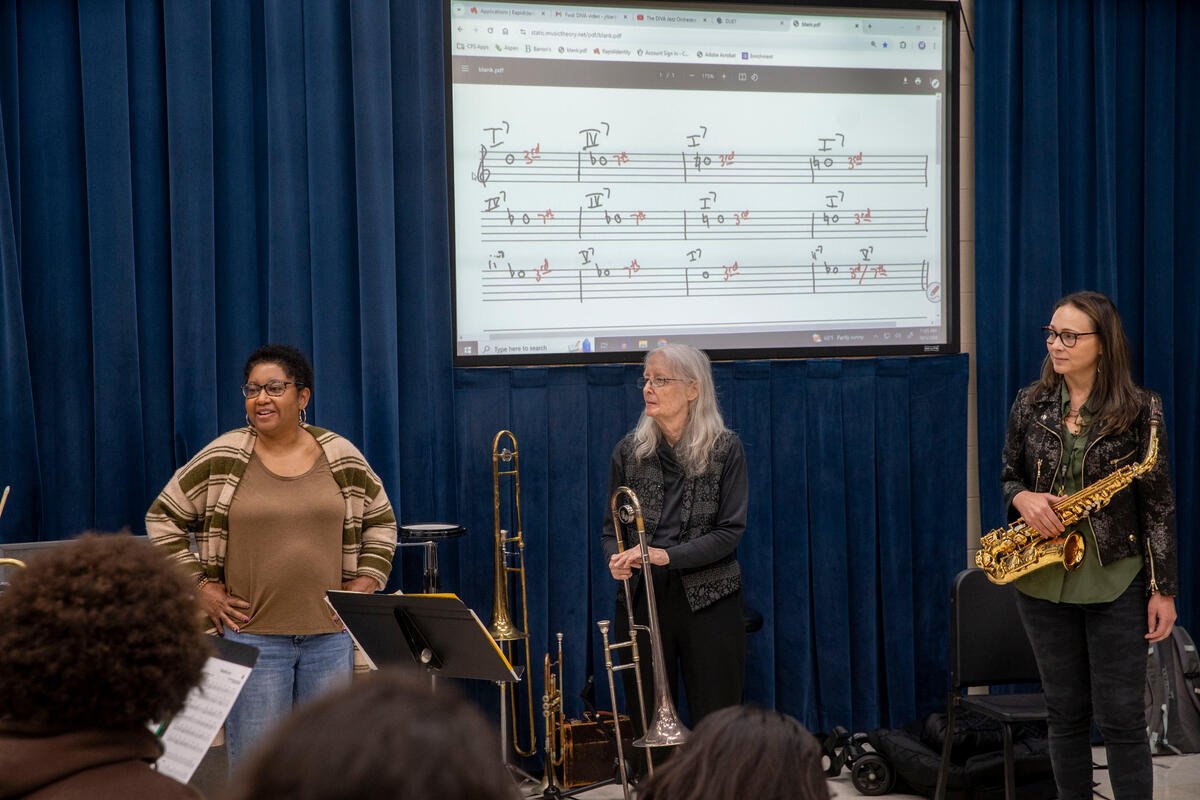By Jasminne Hernandez
For 30 years, Ravinia Festival’s Reach Teach Play program has transformed the lives of young musicians through its Jazz Mentor Program. The initiative offers pre-professional training to two dozen or so talented Chicago Public High School student musicians each year—forming an ensemble known as the Ravinia Jazz Scholars—while also annually reaching 1,000 students in Chicago Public Schools through workshops led by Chicago’s top jazz musicians: the Ravinia Jazz Mentors.
The program’s comprehensive curriculum includes individualized instruction in jazz performance, improvisation, music theory, and more. It also offers exclusive workshops and master classes. As the program celebrates its 30th anniversary, its impact on the Chicago music scene (and beyond) is more evident than ever.
A Program That’s Grown in Every Way
Since its inception in 1995, the Jazz Mentor Program has grown significantly. “We began with a quintet of Jazz Mentors and have since expanded to eight. The number of scholars has grown from 13 in the beginning to 34 last year, our largest ever,” said lead mentor Pat Mallinger, an esteemed saxophonist who has been with the program from the start.
The training has also evolved. “We added a big-band format and modules that offer six weeks of training in areas like theory, improvisation, ear training, jazz history, and rhythm,” Mallinger explained.
More Than Music
In 2023, another exciting initiative was introduced: “Want to Play Jazz? A Workshop for Young Women,” founded by trombonist Audrey Morrison. “About a year and a half ago, Reach Teach Play Director Christine Taylor Conda asked, ‘Why aren’t more female musicians auditioning for the Jazz Mentor program?’ ” Morrison recalled. “This led to the creation of the women’s workshop, to encourage young female musicians to pursue jazz, a traditionally male-dominated field.”
In October, Ravinia Jazz Mentor and trombonist Audrey Morrison (front, fourth from left) led a workshop for young women in jazz at Whitney Young High School in Chicago. Guest mentors included several women active on Chicago’s jazz scene, including 2016 & ’17 Ravinia Jazz Mentor Program alum and bassist Carmani Edwards (front, third from right), plus saxophonist Sharel Cassity (front, third from left), trumpeter Emily Kuhn (front, fifth from left), and guitarist Lisa Baker (front, fourth from right). (Photo: Ravinia/Kyle Dunleavy)
The workshop brings in accomplished female jazz musicians as clinicians to mentor young students, and while not an official part of the Jazz Mentor Program, the workshop has had a direct impact on it and has encouraged more young women to audition to be Jazz Scholars. “Our goal has been to help give them confidence and a passion to do so, and it has paid off,” said Morrison. The number of female musicians who auditioned doubled, and a record-breaking seven women were accepted into the program this year.
“Role models are incredibly important,” said Morrison. “In the workshop, students receive one-on-one instruction, hear personal stories about breaking into jazz as a woman, and gain insight into navigating the field. Everyone comes away with a new perspective about women in jazz.”
The Impact of Mentorship
The Jazz Mentor Program’s success can be attributed to its thorough approach. “This is the only jazz program that offers mentoring from eight jazz musicians on a weekly basis,” said Mallinger. “ We mentor students so they can be prepared for music or whatever they choose for their profession. We also guide them through life like high school, relationships, and college decisions.”
Morrison highlights the importance of intergenerational mentorship for young women: “Having Jazz Scholar alum [bassist] Carmani Edwards return to lead a workshop like Want to Play Jazz? was a ‘full circle’ moment that inspired us all. The students could see the result of hard work, supportive mentorship, and the drive to succeed before their very eyes.”
Ravinia Reach Teach Play director Christine Taylor Conda (left) talks with the Chicago Public High School student jazz musicians attending the “Want to Play Jazz?” workshop. (Photo: Ravinia/Kyle Dunleavy)
Looking Forward
Reflecting on his three decades with the program, Mallinger said, “It’s wonderful to hear from Jazz Scholar alumni who frequently share their gratitude. For me, it’s beautiful to pass on the same passion for jazz I had as a youth to thousands of CPS students.” Morrison shares similar sentiments, offering advice to young women entering jazz: “Put all your focus and energy into becoming the best player you can be, and let that speak for itself. There may be some who cannot accept you being an equal. Do not let them pull you down. Instead, seek out and surround yourself with musicians and mentors who support you and guide you.” ◼






